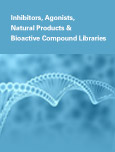Breast Tumor Kinase (BRK, also known as PTK6) is normally expressed in the differentiating epithelial cells of the intestine, skin, prostate, and oral cavity, where it has been shown to promote cellular differentiation, apoptosis, and more recently to mediate migration/wound healing. In tumors which over express Brk this Src-family, nonreceptor protein-tyrosine kinase has been implicated as a mediator of cancer cell phenotypes, including increased proliferation, survival, and migration. Potential Brk substrates include RNA-binding proteins: Sam68, SLM-1, SLM-2, and PSF; transcription factors: STAT3 and STAT5a/b; and a variety of signaling molecules: p190RhoGAP, paxillin, Akt, IRS-4, BKS/STAP-2, and KAP3A.
Studies have shown that Brk interacts with the ErbB family signaling pathway. Kamalati et al. demonstrated an interaction between Brk and the ErbB family member EGFR and over expression of Brk enhanced EGF-induced proliferation.
There are no or limited specific Brk/PTK6 inhibitors reported to date. Dasatinib, a Src/Abl multi-kinase inhibitor that is approved for chronic myelogenous leukemia (CML), is a potent PTK6/Brk (IC50=9 nM). XMU-MP-2 exhibited target-specific inhibition of BRK kinase activity and disrupted signaling pathways both in vitro and in vivo. BRK inhibitor P21d is a potent, selective, cell permeable inhibitor of breast tumor kinase (Brk, PTK6) with IC50 of 30 nM, shows no inhibitory activity against Aurora B and Lck (IC50>20 uM), exhibits potent cellular activity with p-SAM68 IC50 of 52 nM, downregulates SNAIL protein and restores E-cadherin expression in TNBC cells.
References:
1. Jiang J, et al. Cancer Res. 2017 Jan 1;77(1):175-186.
2. Ito K, et al. Cancer Res. 2016 Aug 1;76(15):4406-17.
3. Zeng H, et al. Bioorg Med Chem Lett. 2011 Oct 1;21(19):5870-5.
4. Shen CH, et al. Cancer Res. 2008 Oct 1;68(19):7779-87.













